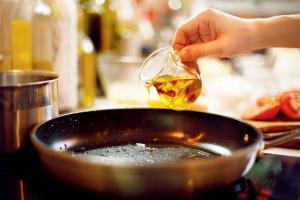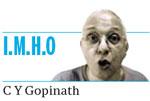Till Ancel Keys bullied his way into the picture, everyone was healthy and happy. Coconut oil, palm oil ruled. And then, fat became the villain.

Representation pic/Getty Images

I enter the garden. There are 24 people. You kill 20. How many people are there in the garden?
ADVERTISEMENT
This puzzle popped in my Facebook feed about 10 days ago. Can you crack it? Let me warn you ahead that the following answers are wrong — 4, 5, 21, 24 and 25.
It's really neither a trick question nor mathematics but more of a demonstration of how poorly human beings listen and think. To be exact, when we see two things side by side, we conclude they must be connected.
The weather is getting warmer. Ice cream sales are rising at the same time. It's called a correlation. In this case, because it's the hot weather that makes people want something cold, there is also causation.
But what if I told you that I always find the sun setting when I go to my balcony around 5 pm to sip wine? Would you say I was making the sun set?
What if things happen to be together but you wrongly assume they're connected?
Between 2000 and 2009, the per capita consumption of mozzarella cheese went up from 4.2 kg to 4.6 kg. Oddly enough, in the same period, the number of people who died by becoming tangled in their bedsheets went up from 327 to 717. Would you skip the mozzarella in future?
Mistaking correlation for causation is how bad things happen to good people.
A stunning example is the assumption, now taken as axiom, that a high level of cholesterol causes heart disease. Growing evidence has now debunked this theory but a thought once thought is not easily unthought. The theory was promoted by just one pushy, manipulative scientist who was convinced, without enough evidence, that he was right and that proof would come along soon enough.
If you had to point to one man whose fallacious thinking seventy years ago created a planet of sick, obese men and women dying of diabetes, heart disease and cancer, look at Dr Keys. He believed that just because two things happened together, one caused the other.
I really don't like Ancel Keys, god rest his cherry-picking, bulldozing soul. Till 1950, he had been an unknown boffin, studying how people's health was affected when they ate wartime rations, which had less fat and fewer calories. He read a paper that noted that countries on wartime rations also seemed to have lower rates of heart disease.
He dug around a little and found a WHO scatter graph showing that in some countries as fat consumption rose, so did heart disease. Out of this, he made a simple, iconic rising line graph which became a meme — and the cholesterol-heart disease hypothesis was on its way.
Around then, an industry body called the American Soybean Association (ASA), representing soybean farmers, was looking for ways to get people to switch from coconut oil and palm oil to their polyunsaturated soybean oil. Keys had just completed his so-called Seven Country Study, where he claimed that countries that ate lots of fats and cholesterol had lots of heart disease. He assumed that correlation meant causation.
The ASA didn't care. They loved his spurious science. Abetted by wealthy donors, they ran an aggressive campaign that successfully villainized coconut oil and palm oil, replacing them with soybean oil. The new mantras were "low-fat" and "zero cholesterol". A billion-dollar industry grew up to sell cholesterol-reducing statins everyone over 45.
Keys was publicly fact-checked and challenged but, like Donald Trump, he knew that if he repeated a dubious truth often enough and with confidence, it would become the alternative fact. Two scientists wrote, "No matter how plausible such an association may appear, it is not in itself proof of a cause-effect relationship. But quotation and repetition...soon creates the impression that the relationship is truly valid."
Quotation and repetition were Keys' hallmark methods by which he convinced America and thereby the rest of the planet that fats, cholesterol, coconut oil and palm oil were toxic.
Never mind that Eskimos eat nothing but whale blubber, have high cholesterol and yetlow rates of heart disease.
Never mind that Japanese people live healthy and long without heart disease despite eating a saturated-fat-heavy diet.
Never mind that Kerala, Indonesia, Thailand and the Philippines have thrived on diets based on coconut oil.
Never mind, actually, that even after reading this, you will still have your doubts and will probably pop your statin pill tonight. Just in case cholesterol actually causes heart disease.
I'm sure you're burning up to know the answer to the puzzle. Well, it's true that the two sentences are side by side: I enter the garden and There are 24 people. But it was you who assumed that the 24 people were also in the garden. I did not say it. Wherever those 24 people were and whoever killed them is irrelevant.
I was, and still am the only one in the garden.
Here, viewed from there. C Y Gopinath, in Bangkok, throws unique light and shadows on Mumbai, the city that raised him. You can reach him at cygopi@gmail.com
Send your feedback to mailbag@mid-day.com
The views expressed in this column are the individual's and don't represent those of the paper
Keep scrolling to read more news
Catch up on all the latest Mumbai news, crime news, current affairs, and a complete guide from food to things to do and events across Mumbai. Also download the new mid-day Android and iOS apps to get latest updates.
Mid-Day is now on Telegram. Click here to join our channel (@middayinfomedialtd) and stay updated with the latest news
 Subscribe today by clicking the link and stay updated with the latest news!" Click here!
Subscribe today by clicking the link and stay updated with the latest news!" Click here!







